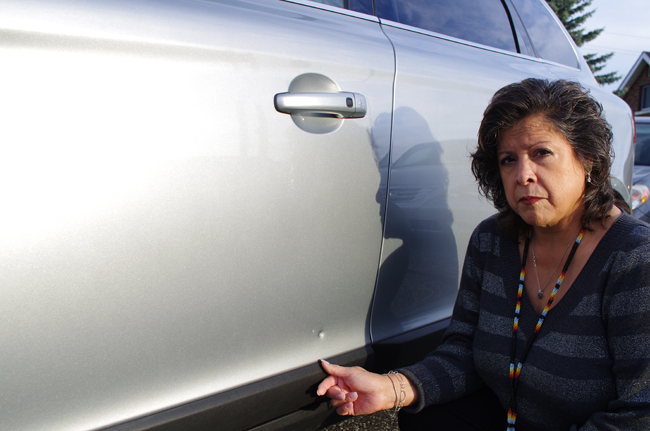Respond to racism with reconciliation: Wesley-Esquimaux

By Rick Garrick
THUNDER BAY – Cynthia Wesley-Esquimaux is calling for outreach and healing after a rash of apparently racist incidents in the Lake Superior region’s largest municipality.
A teepee was slashed on ceremonial grounds at Lakehead University, where the Georgina Island First Nations woman is serving her first year as Vice-provost, Aboriginal Initiatives.
Local police are investigating the incident, and the Ontario Fire Marshal’s office is investigating a fire that closed the James St. bridge between the city and Fort William First Nation. Disturbing comments were posted online after the incident in late October.
“Rather than a punitive standpoint, let’s have a conversation about this and let’s see what we can do that would serve as restitution as opposed to retribution,” says Wesley-Esquimaux. “It works in an amazing way and it brings more people into our circle than it pushes out.”
She says five Lakehead University students who had some involvement with the two incidents had “life-changing events” after meeting with Fort William’s chief and council, speaking with Elders or taking part in a sweat lodge ceremony.
“I would say the lesson learned from the experiences we have recently had is it’s better to find a way to build reconciliation between Native and non-Native kids in the city and hope that will rub off in the future rather than create further division.”
“Obviously there is a lot of conversation about (racism), but I think we have to move into a new era,” Wesley-Esquimaux says. “If we are going to talk about reconciliation with the Truth and Reconciliation Commission, what does it actually look like? What it actually looks like is extending your hand and saying ‘Okay; that was then and this is now and what are we going to do together in the future?’”
The respected First Nations educator says a teepee was donated to Lakehead by a Thunder Bay resident after the slashing incident.
“We had the teepee ceremony,” she says. “We got some nice commentary from people out there thinking about it.”
Although Wesley-Esquimaux has also faced a series of disturbing incidents in her suburban neighbourhood since signing on with the university in early July – her home was egged twice and her car stoned once – she says the situation has improved since late September.
“Mind you, I have to keep the car in the garage,” she says. Stone caused substantial damages to her vehicle. “I did get it fixed and it is fine.”
She says her initial reaction to the incidents was disbelief.
“That’s never happened to me before, anywhere,” says Wesley-Esquimaux, a former University of Toronto assistant professor, former Mental Health Commission of Canada advisory member and 2011 federal candidate for the York-Simcoe riding in southern Ontario. “And I’ve lived in a lot of places.”
She likes to send out the message that First Nations people are “not so different” from other people.
“We want healthy children, we want education, we want our families to be well. We want the same things as other human beings.”


